Movie Review: Mr. Brooks
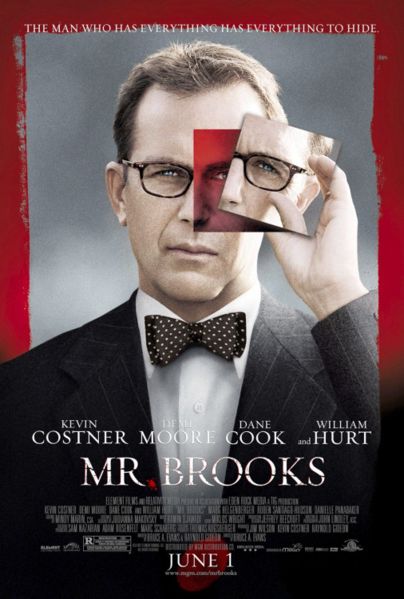 | | Mr. Brooks |
Kevin Costner used to be considered a blockbuster movie star, but ever since his glory days of Robin Hood: Prince of Thieves and JFK—and despite a few surprisingly good films like Thirteen Days—he spells death for any production. It is therefore fitting that, in his latest film, Mr. Brooks, Costner plays a serial killer.
The amazing thing, though, is that he does a fine job of it. Costner’s Earl Brooks is an upstanding businessman who has been warring with Marshall, a manifestation of his murderous id played by a deliciously fun-loving William Hurt, while raising a healthy, seemingly normal family. His attempts to control his psychopathic tendencies leads him to Alcoholics Anonymous and has him constantly reciting the serenity prayer, and Costner manages to play it without any hint of campiness. He sells it so well that you not only believe in his desire to be a normal person, but you root for him.
Unfortunately, that’s only half the movie. Much like Mr. Brooks himself, the film is fractured in two. While the Mr. Brooks half is an inspired and clever take on a seemingly exhausted subgenre, the other half, a police detective story starring Demi Moore, is chock-full of the most awful clichés, predictably ridiculous coincidences, and stupid subplots that have mired the modern-day serial killer flick.
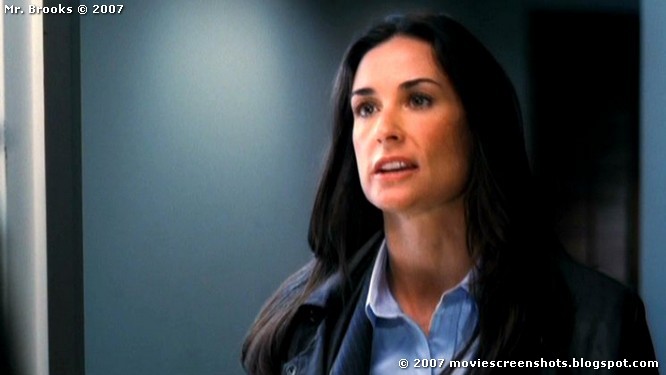 | | Prepare yourself for the acting chops of the Demi Moore! |
While Costner is clearly and successfully doing something new with his talents, Demi Moore, though visibly aging, still seems stuck with the same tiring post-feminist angst she displays in G.I. Jane, Striptease, If These Walls Could Talk, and plenty of other movies not worth mentioning.
Her character, Det. Tracy Atwood, is in the middle of a messy divorce when she comes across the first “Thumbprint Killer” (Mr. Brooks) murder scene in two years. Her captain angrily informs her that she should be off the case until her divorce is settled, but Atwood, in true Demi Moore fashion, refuses to let a sleazy man keep her down. Meanwhile, a completely separate serial killer that the detective previously captured has just escaped from prison, but Atwood isn’t worried, even after he attempts to kidnap and rape her.
There are one or two good action beats in this storyline, but it otherwise feels like a pointless and obligatory digression away from the real story. The movie’s namesake, Mr. Brooks, is a far more interesting, dynamic, and multi-dimensional character than Detective Atwood. While there is a little overlap between the two plots, one could easily exist without the other. Given the choice, of course, I would definitely prefer the whole story from Mr. Brooks’ point of view.
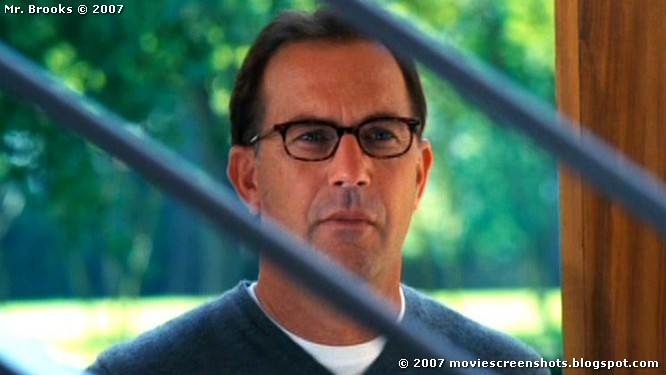 | | This is not Field of Dreams |
Even his actual murder scenes are unique, which is difficult in the days of CSI-style procedurals saturating the market. Mr. Brooks is a careful, clever, and intelligent killer who knows how not to get caught, and the single mistake he makes at the start of the film—not realizing the window is open—is even explained away by Brooks as an unconscious desire to be stopped. Also, even though the movie could easily become enraptured by the sensationalism of murder and the typical trappings of shock value entertainment, there isn’t a lot of blood; it’s more about the psychology of it.
***MINOR SPOILER AHEAD!***
His homelife is interesting, too. Again, the writers could have easily stuck to the formula; they could have shown a normal family and juxtaposed it against murder, but instead they chose to make Mr. Brooks’ household slightly twisted. He is presented with a problem surrounding his daughter—and though he solves it the way one would expect—it’s a storyline I definitely haven’t seen before.
***END SPOILER WARNING!***
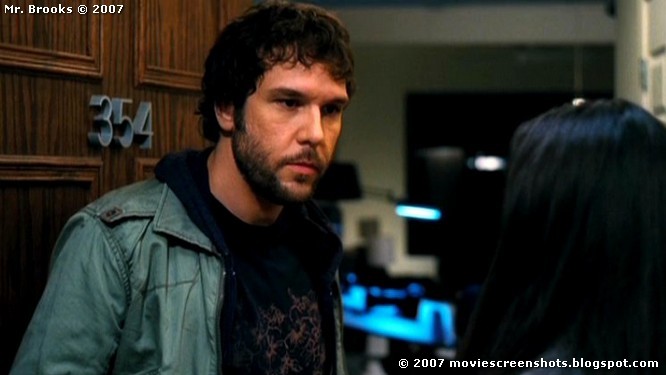 | | This is not Waiting or Dan in Real Life, either |
Further, the central conflict of the story, his blackmail at the hands of “Mr. Smith,” is unique. Mr. Brooks’ aforementioned mistake of leaving the window open during one of his murders pays off in that one of the neighbors, a peeping tom who identifies himself as Mr. Smith, manages to take a few snapshots of the murder-in-progress and uses them to blackmail Brooks into taking him along on his next murder.
Mr. Smith is an interesting character, to be sure, but Dane Cook, who plays him, is an odd choice indeed. Love him or hate him, Cook is a one-trick pony, and that trick is humor. There is nothing about Mr. Smith’s character that is funny, but Cook can’t help but inject a few comedic mannerisms and deliveries here and there, all of which feel dischordant.
The dialogue in the movie is mostly trite, bland, and boring, but there are a few memorable lines. At one point, Marshall, Mr. Brook’s id, remarks about Dane Cook’s character, “Even if that guy was charming and funny, I still wouldn’t like him.” At another point, Detective Atwood’s partner remarks, “I wouldn’t take a bullet, but maybe I’d push you out of the way.”
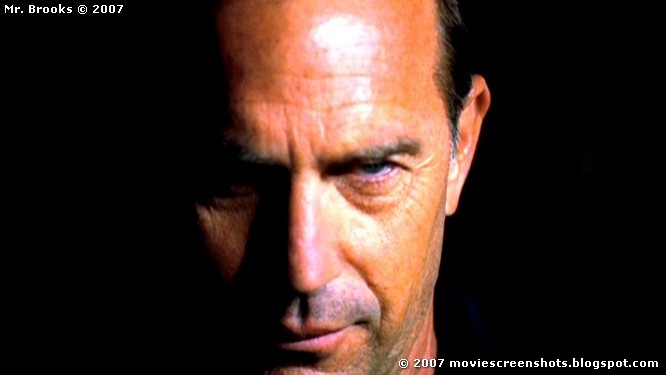 | | He's not a nice man when he takes off his glasses... |
The electronica soundtrack, though good to listen to on its own, feels terribly awkward in the film. It is especially notable during the climax, when the director makes the inexplicable decision to use flashy camera work, strobe lights, and loud techno to accentuate an otherwise methodically plotting film.
Still, despite my myriad complaints, I wanted to like this movie for its strengths. There are several disparate plot threads that are eventually and artfully weaved together without too many inexplicable coincidences, and I find that refreshing. Additionally, I can’t speak enough about how fresh, original, and unpredictable half the story is.
Therefore, I do recommend giving Mr. Brooks a chance, though I can’t in good conscience give it more than three stars. If you surgically removed the detective plotline from the final cut of the film, what you’d have left—though a little on the short side—would be worthy of as much as four and a half stars. However, the detective story, on its own, wouldn’t even get two from me.
-e. magill 05/12/2008
|
|